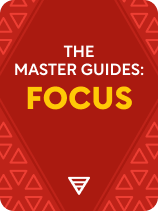

This article is an excerpt from the Shortform book guide to "The Master Guides: Focus" by Shortform. Shortform has the world's best summaries and analyses of books you should be reading.
Like this article? Sign up for a free trial here.
Looking to learn how to make a daily routine for yourself? What strategies do productivity experts suggest?
If you want to make the most of your time and be more productive, learning how to make a daily routine for yourself is the first step. Experts agree that learning to prioritize your tasks, protect your focus time, and align your priorities with your values sets the foundation for a fulfilling daily routine.
Read on to learn how to make and maintain a daily routine for yourself, according to five expert tips.
How to Make a Daily Routine for Yourself
If used effectively, a schedule can help you prioritize and focus on everything that’s important in your life, not just your duties at work. The most basic tool for sticking to a routine is a daily schedule, but you may be wondering how to make a daily routine for yourself if you’ve never tried living by a routine before. Productivity experts agree on the benefits of using a schedule to your advantage and offer various strategies as well as ways to use your schedule to make space for your personal life.
What You Need to Know
Let’s discuss five expert tips for making a daily routine for yourself that you’ll actually want to stick with.
Tip #1: Plan out everything that you need to do throughout the day. Computer science professor Cal Newport discusses focus in Deep Work and points out that when you’re trying to figure out how to make a daily routine for yourself, you should set specific goals by planning out what you’ll work on in advance. This ensures that you’re less likely to switch to other tasks. He recommends breaking your tasks into half-hour blocks, making sure to schedule buffers to handle emergencies or tasks that run over their allotted time.
Tip #2: Block off time to focus, and protect it. In Make Time, Jake Knapp and John Zeratsky point out that you’re not the only one with the power to make a daily routine for yourself. Your supervisors, colleagues, customers, family, and friends will frequently make demands on your schedule. Therefore, when organizing your day, the first thing you must do is block off time to focus on your most important task. If your calendar can be viewed by others at your workplace, this lets them know that you’ve set aside time for your specific project.
Be firm with the time you’ve set aside for yourself, but also make sure that you use that time constructively. In Eat That Frog!, business consultant Brian Tracy recommends that you treat it like an appointment, and keep it. Also, your blocked-off time doesn’t have to happen at the office. Some people find it’s productive to get up early and work for several hours at home, where there are fewer interruptions. Mapping out your time in a planner helps you build your time around getting your most important tasks done without interruption.
| Tools for Managing Your Focus Time Nir Eyal offers Timeboxing as a way of making a daily routine for yourself by dedicating blocks of time to specific activities. For example, you might timebox “read to kids” or “go through emails.” Timeboxing helps you balance your responsibilities and stick to what you’re meant to be doing. You decide what you’ll do and when you’ll do it. This can stop small, easy tasks from distracting you, because you know they’ll get done at another time. When working with smaller increments of time, Knapp and Zeratsky suggest you use a timer as a cue to stay focused on your task. This is known as the Pomodoro Technique, invented by Francesco Cirillo. Using a tomato-shaped kitchen timer—“pomodoro” is Italian for “tomato”—Cirillo would work for 25 minutes before stopping abruptly for a five-minute break. It’s been shown that a regular, brief break from work can help to maintain long-term attention. |
Tip #3: Include personal time in your schedule. In addition to blocking off time for work, Eyal argues that you should schedule regular time with your children, your partner, and your friends. In Indistractable, he says that this time is a commitment, not something that can be pushed aside for another activity or interrupted by your email or social media. Without maintenance, your relationships easily dissipate, and so your plans with friends and family need to be regular, set events in your schedule, not items on a to-do list.
Tip #4: Select one priority per day. In Make Time, Knapp and Zeratsky suggest that the most important step to being proactive with your daily routine is to choose one task to focus on each day. This won’t be the only thing you do, but it’s the one thing you’ll prioritize over everything else. It might be a project you’ve been putting off at work, or it might be something you’ve always meant to do in your free time. Whatever you choose, it’s the thing you’ll look back on with a feeling of satisfaction, or even joy, at having accomplished. But be flexible. Where you focus your attention doesn’t need to be set in stone; you can change it at any point throughout the day.
Tip #5: Align your priorities with your values. In Essentialism, Greg McKeown suggests stopping regularly to ask yourself, “Am I spending my time and resources on the right things?” When you’re considering how to make a daily routine for yourself, it’s important to invest your time and energy only in what’s essential in order to make your optimum contribution to activities and projects that really matter. Knapp and Zeratsky argue that it might be more important to focus on a project at home, something to benefit your family, or something done for pleasure or growth. The importance of choosing where you focus your attention is that it lets you set your own priorities instead of responding to external demands.

———End of Preview———
Like what you just read? Read the rest of the world's best book summary and analysis of Shortform's "The Master Guides: Focus" at Shortform.
Here's what you'll find in our full The Master Guides: Focus summary:
- A compilation of the best strategies from experts on improving focus
- How improved focus can improve your career and personal life
- How to create a distraction-free working environment






